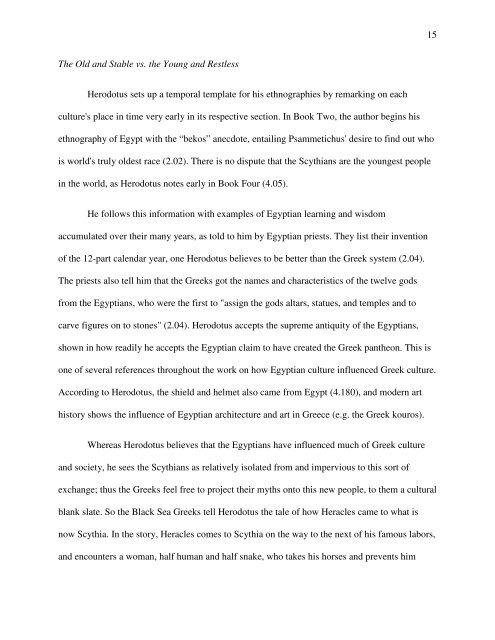The Old and the Restless - The Egyptians and the Scythians in Herodotus' Histories by Robert J. Hagan
Create successful ePaper yourself
Turn your PDF publications into a flip-book with our unique Google optimized e-Paper software.
15<br />
<strong>The</strong> <strong>Old</strong> <strong>and</strong> Stable vs. <strong>the</strong> Young <strong>and</strong> <strong>Restless</strong><br />
Herodotus sets up a temporal template for his ethnographies <strong>by</strong> remark<strong>in</strong>g on each<br />
culture's place <strong>in</strong> time very early <strong>in</strong> its respective section. In Book Two, <strong>the</strong> author beg<strong>in</strong>s his<br />
ethnography of Egypt with <strong>the</strong> “bekos” anecdote, entail<strong>in</strong>g Psammetichus' desire to f<strong>in</strong>d out who<br />
is world's truly oldest race (2.02). <strong>The</strong>re is no dispute that <strong>the</strong> <strong>Scythians</strong> are <strong>the</strong> youngest people<br />
<strong>in</strong> <strong>the</strong> world, as Herodotus notes early <strong>in</strong> Book Four (4.05).<br />
He follows this <strong>in</strong>formation with examples of Egyptian learn<strong>in</strong>g <strong>and</strong> wisdom<br />
accumulated over <strong>the</strong>ir many years, as told to him <strong>by</strong> Egyptian priests. <strong>The</strong>y list <strong>the</strong>ir <strong>in</strong>vention<br />
of <strong>the</strong> 12-part calendar year, one Herodotus believes to be better than <strong>the</strong> Greek system (2.04).<br />
<strong>The</strong> priests also tell him that <strong>the</strong> Greeks got <strong>the</strong> names <strong>and</strong> characteristics of <strong>the</strong> twelve gods<br />
from <strong>the</strong> <strong>Egyptians</strong>, who were <strong>the</strong> first to "assign <strong>the</strong> gods altars, statues, <strong>and</strong> temples <strong>and</strong> to<br />
carve figures on to stones" (2.04). Herodotus accepts <strong>the</strong> supreme antiquity of <strong>the</strong> <strong>Egyptians</strong>,<br />
shown <strong>in</strong> how readily he accepts <strong>the</strong> Egyptian claim to have created <strong>the</strong> Greek pan<strong>the</strong>on. This is<br />
one of several references throughout <strong>the</strong> work on how Egyptian culture <strong>in</strong>fluenced Greek culture.<br />
Accord<strong>in</strong>g to Herodotus, <strong>the</strong> shield <strong>and</strong> helmet also came from Egypt (4.180), <strong>and</strong> modern art<br />
history shows <strong>the</strong> <strong>in</strong>fluence of Egyptian architecture <strong>and</strong> art <strong>in</strong> Greece (e.g. <strong>the</strong> Greek kouros).<br />
Whereas Herodotus believes that <strong>the</strong> <strong>Egyptians</strong> have <strong>in</strong>fluenced much of Greek culture<br />
<strong>and</strong> society, he sees <strong>the</strong> <strong>Scythians</strong> as relatively isolated from <strong>and</strong> impervious to this sort of<br />
exchange; thus <strong>the</strong> Greeks feel free to project <strong>the</strong>ir myths onto this new people, to <strong>the</strong>m a cultural<br />
blank slate. So <strong>the</strong> Black Sea Greeks tell Herodotus <strong>the</strong> tale of how Heracles came to what is<br />
now Scythia. In <strong>the</strong> story, Heracles comes to Scythia on <strong>the</strong> way to <strong>the</strong> next of his famous labors,<br />
<strong>and</strong> encounters a woman, half human <strong>and</strong> half snake, who takes his horses <strong>and</strong> prevents him
















